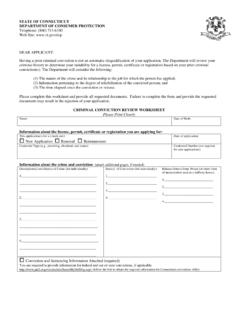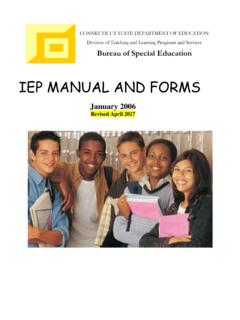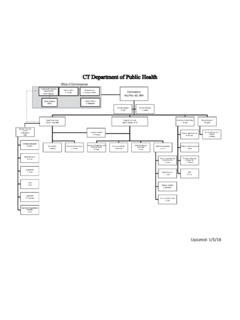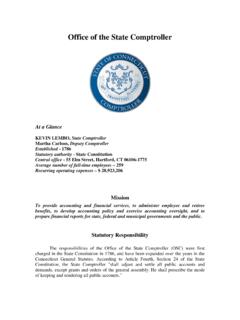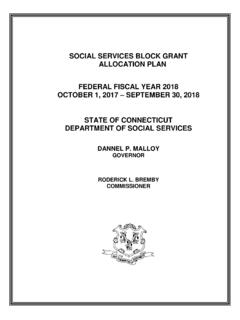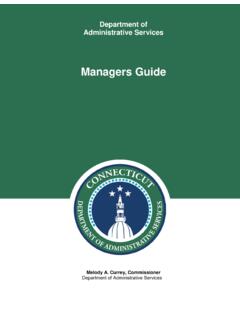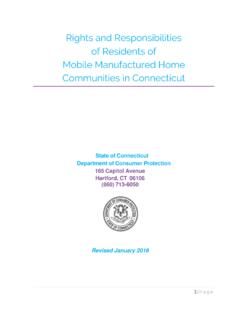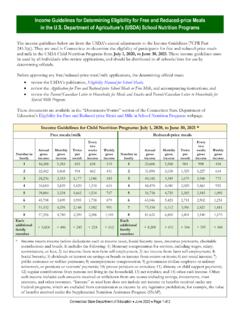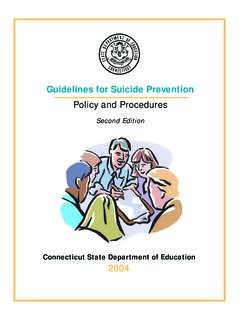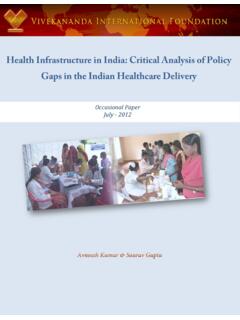Transcription of The Benefits of Second Language Study - Connecticut
1 Regarding World Language Education NEA Research, December 2007 The Benefits of Second Language Study Research Findings with Citations Contents Page Status of Second Language Study 1 Research Findings: Second Language Study : .. Benefits academic progress in other subjects 2 ..narrows achievement gaps 3 .. Benefits basic skills development 3 .. Benefits higher order, abstract and creative thinking 4 ..(early) enriches and enhances cognitive development 4.
2 Enhances a student's sense of achievement 4 ..helps students score higher on standardized tests 5 ..promotes cultural awareness and competency 5 ..improves chances of college acceptance, achievement and attainment 6 ..enhances career opportunities 6 .. Benefits understanding and security in community and society 6 ..barriers 6 Bibliography 7 Web References 12 _____ Status of Second Language Study in the USA "A pervasive lack of knowledge about foreign cultures and foreign languages threatens the security of the United States as well as its ability to compete in the global marketplace and produce an informed citizenry.
3 The education system has, in recent years, placed little value on speaking languages other than English or on understanding cultures other than one s own. Although there have been times in the country s history when foreign languages were considered as important as mathematics and science, they have reemerged as a significant concern primarily after major events that presented immediate and direct threats to the country s future. Most recently, the events of September 11, 2001, compelled the federal government to reflect on the expertise of its personnel and to focus attention on the need for more and better Language skills, particularly in certain languages considered critical.
4 It would be shortsighted, however, to limit national attention to the needs of government alone. Language skills and cultural expertise are also urgently needed to address economic challenges and the strength of American businesses in an increasingly global marketplace. Professions such as law, health care, social work, and education call out for an international dimension that reflects the changed world environment and increasingly diverse population. The education system from elementary and secondary school to higher education needs the capacity to provide the requisite training. Higher education needs the 1capacity to serve as a resource on the politics, economics, religions, and cultures of countries across the globe, countries whose positions on the world stage change over time, often in unpredictable ways.
5 " (National Research Council 2007) "All but two countries (Ireland and Scotland) in the European Union mandate the Study of a foreign Language , which usually begins in primary school. With the exception of Italy and Wales, all European students must learn a foreign Language throughout their compulsory education." (Eurydice 2005) "Interest in and support for Language Study has been strengthened in the United States in recent years by the growing recognition that proficiency in more than one Language Benefits both individual learners and society. For the individual Language learner, research has found a positive link between Second Language proficiency and cognitive and academic ability.
6 (And)..a multilingual workforce enhances America s economic competitiveness abroad, helps maintain our political and security interests, and promotes tolerance and intercultural awareness." (Marcos & Peyton 2000) In addition to developing a lifelong ability to communicate with people from other countries and backgrounds, other Benefits include improved overall school performance and superior problem-solving skills. (Bamford & Mizokawa 1991; Hakuta 1986) Second Language Study Benefits academic progress in other subjects Applying current standard practices of foreign Language instruction ("Five Cs of Communication, Culture, Connections with other disciplines, Comparisons with students' native languages and cultures, and use of the foreign Language in Communities outside the classroom") reinforces English Language course content of other coursework.
7 (Curtain & Dahlberg 2004) Learning another Language can enhance knowledge of English structure and vocabulary (Curtain & Dahlberg, 2004). A Study of 13,200 third and fifth graders in Louisiana public schools revealed that, regardless of race, gender, or academic level, children taking foreign Language classes did better on the English section of the Louisiana Basic Skills Test than those who did not. (Dumas 1999) Strong evidence shows that time spent on foreign Language Study strongly reinforces the core subject areas of reading, English Language literacy, social studies and math. Foreign Language learners consistently outperform control groups in core subject areas on standardized tests, often significantly.
8 (Armstrong & Rogers 1997; Saunders 1998; Masciantonio 1977; Rafferty 1986; Andrade 1989; Kretschmer & Kretschmer 1989) One Study found students scored significantly higher in math and Language arts after one semester of foreign Language Study 90 minutes per week. (Armstrong 1997) Foreign Language learners consistently outperform control groups in core subject areas on standardized tests often significantly. (Armstrong & Rogers 1997, Saunders 1998, Masciantonio 1977, Rafferty 1986, Andrade, Kretschmer & Kretschmer 1989) Students who started kindergarten in the first Kansas City foreign Language magnet schools in 1988 had surpassed national averages in all subjects by the time they reached fifth foreign Language students performed especially well in mathematics.
9 (Eaton 1994) Foreign Language students within an urban magnet program scored well above anticipated national norms in both reading and mathematics and higher than the average of all magnet 2school participants, despite the fact that they represent a broad cross-section of the local community. (Andrade 1989) Mastering the vocabulary of a Second Language enhances student comprehension and abilities in reading, writing, mathematics and other subjects. (Saville-Troike 1984) Bilingualism fosters the development of verbal and spatial abilities. (Diaz 1983) Students learning a Second Language in elementary school surpassed those who were not in English reading and Language arts tests.
10 (Mavrogenes 1979). Early Second Language Study promotes achievement in English vocabulary and reading skills. (Masciantonio 1977) Foreign Language learners consistently score higher than their non- Language -learning peers in measures of English vocabulary, particularly when the Language studied has Latin roots. (Masciantonio 1977) Second Language Study narrows achievement gaps Children of color, children from economically disadvantaged backgrounds, and English Language Learners make the greatest proportionate achievement gains from foreign Language Study . Early foreign Language Study is less dependent on previous verbal learning than most other elements of the elementary school curriculum and this allows some students to succeed who have otherwise experienced repeated failure in school.
